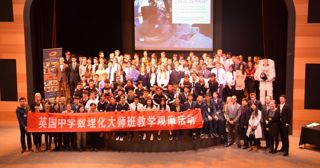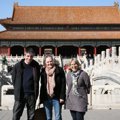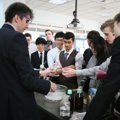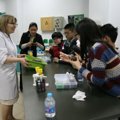
Half the World Away
- 5th Apr 2016
- Author: Kierann Shah
One of the things I love about science is that it doesn’t have borders: gravity doesn’t check your passport before bringing you down to Earth, chemical reactions don’t have national affiliations, and the same experiments can be done in classrooms around the world with exactly the same results. I saw this first hand recently when taking a team from the National Space Academy to deliver a series of masterclasses for students and teachers in both Beijing and Shanghai.
Now, the National Space Academy is not a place – there isn’t a physical Academy located somewhere in the UK – rather we are an organisation that provides a range of programmes across the UK. The National Space Centre in Leicester is our headquarters and one of our main funders, since we help to meet its charitable aims of engaging young people with science. Our team delivers everything from secondary-level student masterclasses and teacher training courses to space careers conferences and a post-16 course called Space Engineering. We’ve got a lot going on!
We use contexts from real-life space science and technology and interactive examples to engage people with science. One of the main ways we do this is by bringing together current secondary teachers and professional space scientists and engineers to lead our courses.
The team that went out to China included Judith Green from Robert Smyth Academy, Chris Carr from Baysgarth School (both nationally recognised as expert and outstanding science teachers), and space scientist Dr Hugh Mortimer from Rutherford Appleton Laboratory (RAL) Space. They delivered sessions alongside those from our Director, Anu Ojha OBE, and myself.
Although we went out to teach we also spent a lot of time learning – I learned that in modern Chinese culture it is important to commemorate collaborations with photographs, hence our opening and closing sessions both featured huge group photos.
We discovered that the UK education is seen as a high quality brand overseas, a reputation driven by UK-led international schools and university partnerships.
We found that taking a life-size cardboard cut-out of Tim Peake on the bullet train from Beijing to Shanghai whilst keeping him intact is difficult, but not impossible.
More importantly we also found, again and again, that the students and teachers we met were incredibly welcoming and keen to learn and get involved. The feedback stated that the participants wanted more opportunities to work with us, which was brilliant to hear.
So Why China?
How did this project come about? Well, the British Council, which is part of the government’s Foreign and Commonwealth Office (FCO), works on projects for UK organisations to collaborate overseas in areas which would benefit both the UK and the partner country. It just so happens that the education and space sectors are two areas where the British Council hopes to foster partnerships.
Chinese state education is traditionally considered to be very content-focussed, producing young people with great factual knowledge, whereas the UK education system is thought to focus more on skills, producing creative and innovative thinkers. As China develops a wider range of commercial and scientific endeavours, that creativity and innovation becomes more and more important. The UK space industry is a world leader in satellite design and development, but it needs international partners to make its space businesses viable, and China could be a great market.
For these reasons, the FCO funded our pilot week of workshops. The host schools gave their time and facilities without charge, and in return their students and teachers were able to join in on the sessions.
The biggest lesson that we learned from our work in China is that science, and certainly space science, affects us globally: from our daily use of satellite navigation and communication to our space-based observations of our planet. This is one reason why international collaboration in science and engineering is so important.
Improving our world and lives through science is a global concern, and working together to share scientific knowledge is the fastest and best way to achieve this. It was put brilliantly at the closing ceremony by one of our staunchest supporters in China, Professor Yu Junsheng, who said, “When we look out at the Universe, we are minded to protect our planet. Through science and technology, we hope to improve life on Earth.” Science is, in many ways, universal – and I am proud to think that our project may have made a contribution to connecting scientists, students, and teachers internationally.
With thanks to:
The British Council, British School in Beijing Shunyi, Nord Anglia International School Shanghai Pudong, The British Embassy in China, Professor Yu of the Beijing University of Posts and Telecommunications, Professor Gethin Roberts of Nottingham Ningbo University, Dr Hugh Mortimer of RAL Space, STFC, Sino-UK Programme of Collaboration in Space Science and Technology







